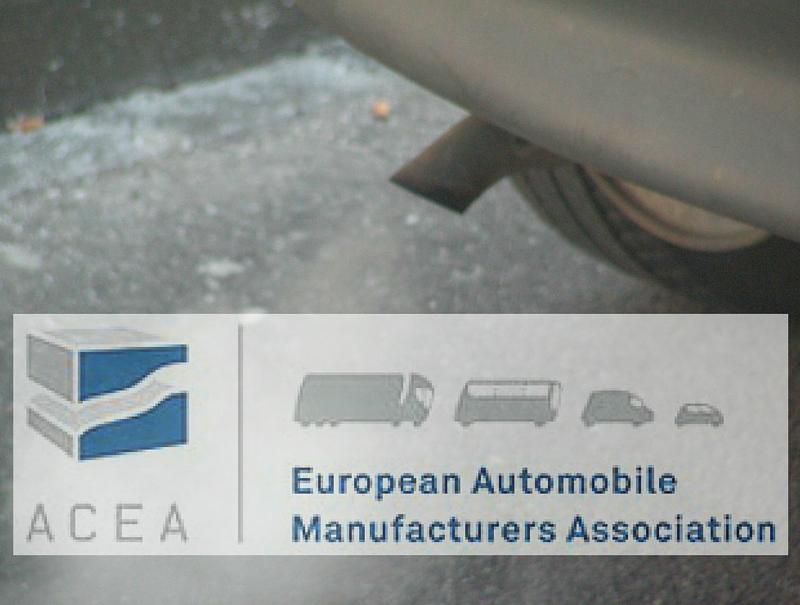
Leak shows Commission giving inside information to car lobby on new emissions tests
As the Parliamentary Committee of Inquiry into the dieselgate scandali begins its work in Brussels, a leaked lobbying document from the European car manufacturers' lobby, ACEA (European Automobile Manufacturers' Association), reveals a sophisticated, multi-faceted behind-the-scenes lobbying strategy aimed at weakening new emissions tests.
Last September's dieselgate scandal exposed how car manufacturers were meeting legal NOx emissions limits in laboratory tests, but massively exceeding them on the road (by up to 40 times in the case of Volkswagen). While this was news to the general public, the European Commission had known manufacturers were vastly exceeding limits back in 2011 and was designing new on-the-road tests, or 'Real Driving Emissions' (RDE) tests, to tackle the problem in diesel cars. But as the leak shows, ACEA and its members had other plans. Their intention: to weaken and delay the new tests, scheduled to be finalised in 2015 and introduced in 2017, which could prevent thousands of premature deaths every year but would most certainly dent profits if implemented in full.
The leak comes in the form of a presentation by ACEA from February 2015, months before crucial votes on what would or wouldn't be included in the new tests, how stringent they would be, and by when they should be introduced.
The document reveals how a secretive weekend meeting between the Commission and ACEA guided the latter's four-stage negotiating strategy; how ACEA was prepared to compromise far further if pushed – but never needed to due to inside information from the Commission; and how it used EU member states to block proposals it didn't like when the Commission didn't prove sufficiently malleable.
As well as providing a rare glimpse into the lobbying strategies of the car industry, it also makes a mockery of the Commission's claim that there is no conflict of interest when closely involving car manufacturers in crafting regulations they will then have to adhere to. Both the Commission and industry claim the interactions and information they exchange are merely technical and not political but, if further proof was ever needed, this leaked lobby document shows this as patently untrue. Unfortunately, perpetuating this myth of technical neutrality has allowed car manufacturers and their lobby groups into all relevant parts of the legislative process – from initial thoughts on what a directive should look like up to deciding the fine details of its implementation.
Despite the dieselgate scandal and the ensuing public outrage, industry still got what it wanted with regards to the new RDE tests. First by weakening the test conditions, then getting governments to support an enormous loophole allowing manufacturers to exceed emissions requirements by more than twice the legal limit. The latter was voted through by national governments on October 28th, only a month after the dieselgate scandal hit, and then passed by the European Parliament at the beginning of February. If that fact alone wasn't enough, this document further underlines the necessity of ending the close relationship between regulators and those being regulated. Tobacco lobbyists would not be allowed to write tobacco control legislation, so why should ACEA be allowed to do similar?
Informal weekend meetings: car lobbyist handed inside info from the Commission
Much of the lobbying strategy presented in the document is based on a secretive meeting between one of ACEA's key lobbyists, Emissions and Fuels Director Paul Greening, and Nikolaus Steininger, Policy Officer at the European Commission's Automotive Industry Unit within the Directorate General for Internal Market, Industry, Entrepreneurship and SMEs (DG GROWTH). In other words, an informal meeting took place in which highly-sensitive information was shared between two men heavily involved in the process, one in charge of coordinating industry's lobbying strategy, one from the governmental body charged with regulating said industry.
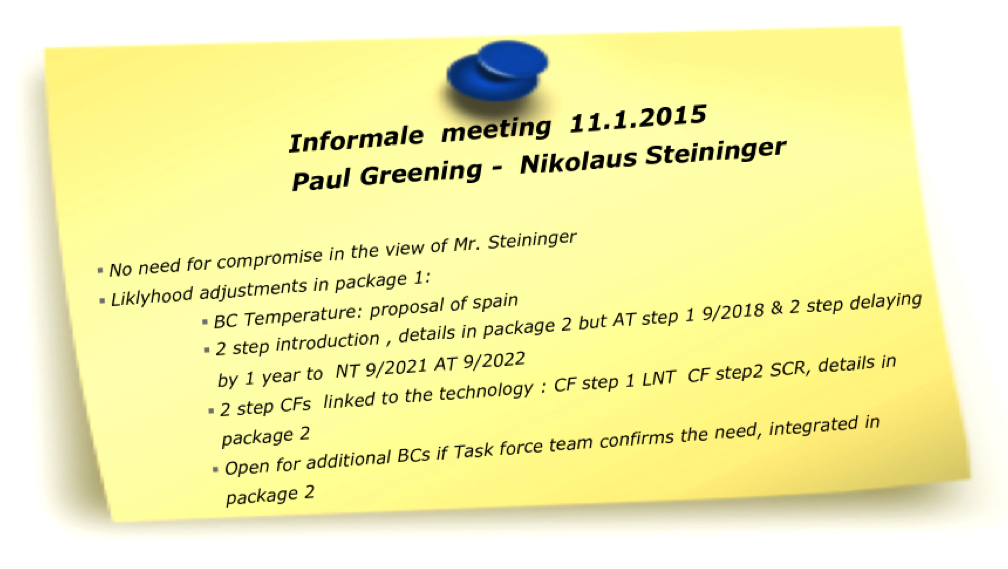
The slide (see picture) shows the 'informal' meeting took place on 11 January 2015, but when CEO requested a list and minutes of all meetings between DG GROWTH and ACEA and its members, there was no trace of it. In a follow up request, asking specifically about this meeting, the Commission asked, “could you please confirm that it is really 11 January 2015 that you meant, as this day was a Sunday?” At the time of publishing, the Commission has twice extended its legal deadline to respond to the request.

So informal meetings between the Commission and ACEA were taking place on a Sunday, far beyond the reach of the EU's transparency legislation. While this is already cause for concern, what was shared makes this untransparent encounterii even more worrying. According to the lobby strategy document, Steininger told ACEA there was “no need for compromise” in his view, ie ACEA didn't need to weaken its negotiating position to get what it wanted from the new RDE tests. Steininger then went on to outline where the Commission was likely to adjust its position towards that of ACEA and its members.
Steininger also revealed that Spain had already been championing the positions of ACEA, successfully lobbying for limits to be placed on what temperature the RDE test could take place at (one of the 'boundary conditions' ACEA had been pushing for which establish parameters for the tests – and can make them easier to pass). The Spanish Government has been a staunch industry defender, with four factories producing Volkswagen and SEAT cars (which VW also owns) and employing more than 17,000 people, while the German car manufacturer is the biggest lobbyist in Brussels among ACEA's members.
The information shared was not only highly valuable to ACEA, revealing sensitive issues related to the timing of the test introduction and 'conformity factors' (ie by what factor will industry be able to exceed any limits), it also undermined the Commission's public position at that time.
The next slide from the leaked document (see picture) shows a table that plots ACEA's positions (their “walk-in” position as well as their three progressive “compromise” positions), and compares them to the Commission positions. In one column it has the Commission's official position, but next to it is the weaker “EU Commission Compromise” position, which the slide claims is based on “rumours”, ie the information given to ACEA's Paul Greening by Steininger in the informal meeting. These “rumours” formed the backbone of ACEA's subsequent lobbying strategy, and a hardening of its position away from making compromises which would have greatly improved emissions, air pollution, and therefore reduced premature deaths as a result of NOx poisoning. The resulting RDE tests mirrored ACEA's demands on many fronts, containing multiple industry-friendly loopholes that ensured emissions from normal driving conditions will still far exceed those in the new tests.
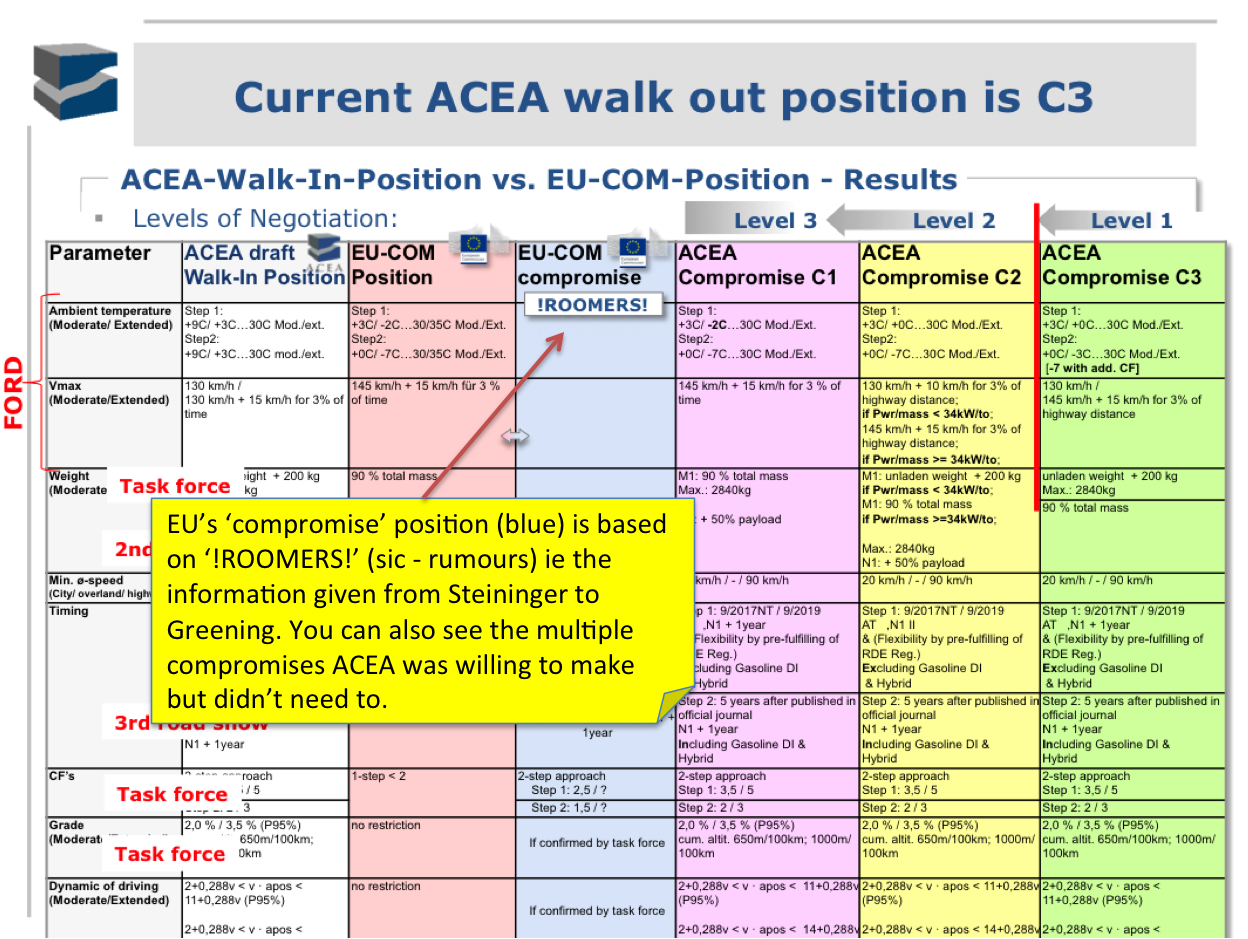
The informal meeting between key people within the Commission and ACEA sharing sensitive and important information underlines how close the relationship is, and one of the reasons why the car industry did not feel the need to compromise on key issues. Commission President Jean Claude Juncker has trumpeted the lobbying transparency agenda, but the privileged access enjoyed by big business is not limited to the Commission's buildings and is exemplified such informal encounters, not to mention the cocktail parties and other gatherings that grease the wheels of the Brussels legislative body.
Setting member states against the Commission
The presentation reveals just how involved ACEA and its members are in helping draw up car industry regulations: from the Expert Group phase advising the Commission before legislation has even been written, through to guiding them on the technical application of legislative decisions in the 'Technical Committee on Motor Vehicles' at the 'Comitology' phaseiii, as well as sitting in special 'task forces' alongside the Commission's in-house scientists, the Joint Research Centre, to work out the 'boundary conditions' for the RDE tests. However, as extensive as its access and involvement might be, the leak also shows ACEA did not put all its eggs in one basket by overly-depending on the Commission. The leak highlights that the key plank of ACEA's strategy was getting European national governments behind its positions, in order to circumvent the Commission when it didn't toe the line.
One important slide (see below) outlines ACEA's own assessment on the different possible timings for when the RDE tests might be finalised, and what they would include.
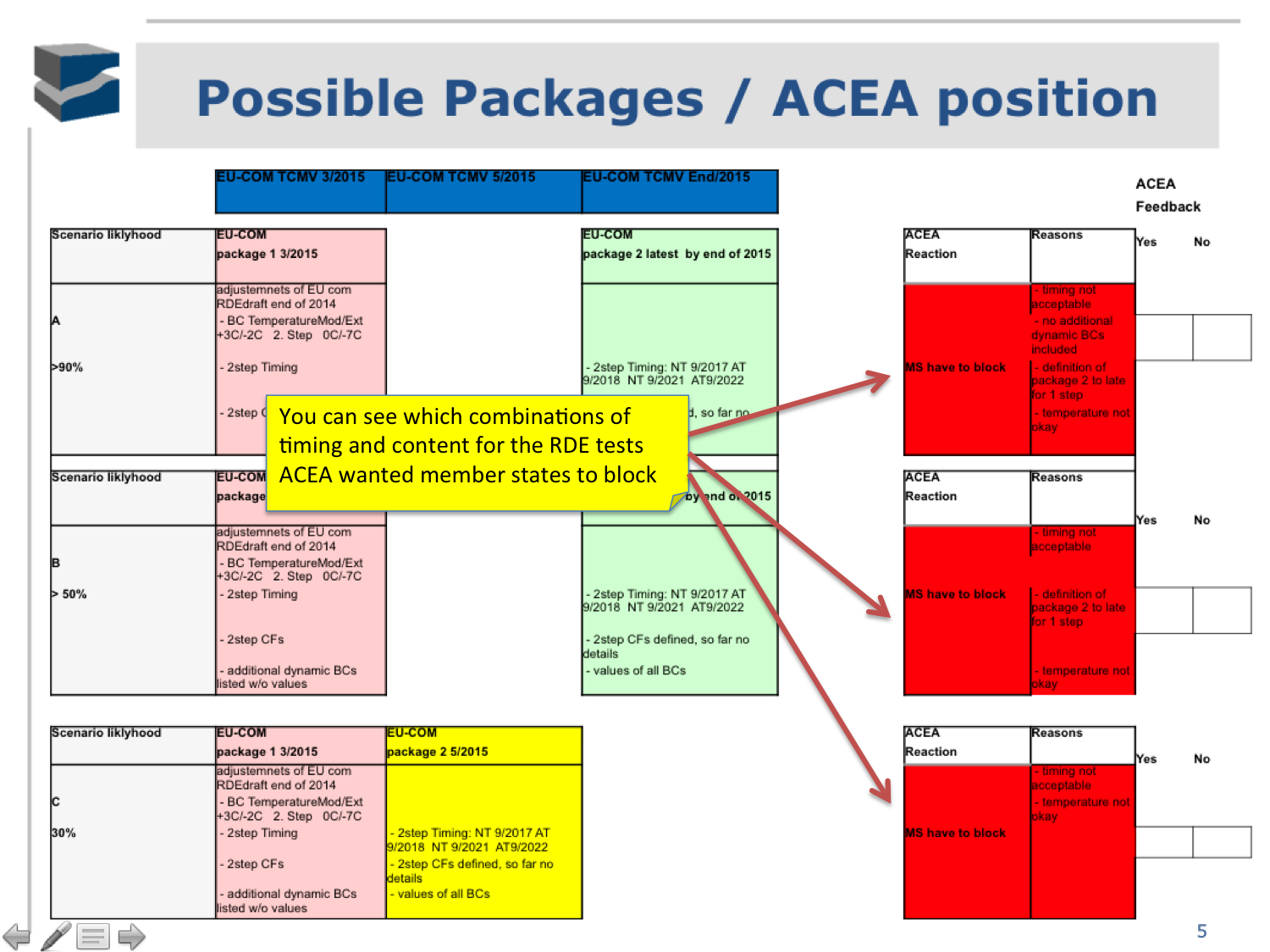
The presentation shows that in order to make good on their assessment of whether national governments should block or not, a great deal of coordination went on at European level among ACEA members. This would ensure they had their own version of reality to present to national ministries of transport, essential if they were to delay or weaken the RDE package in line with ACEA's demands.
As well as identifying which states were the most receptive, this also included: coming up with a complete alternative RDE proposal, replete with their own demands – despite being heavily involved in the Commission's own; providing their own calculations for conformity factors (which allow industry to exceed limits by a certain amount); and creating a common position relating to boundary conditions (ie deciding which conditions the test should be taken under). Armed with this, ACEA members were able to provide supportive national governments with the necessary ammunition to fight the Commission's proposal.
Getting member states on board
Once the key arguments were assembled and countries identified, the lobby document shows ACEA's main strategy was to bring member states on board via the 'ACEA RDE Roadshow'. Inferring from the presentation, which references the 'ACEA RDE Roadshow Part 2' (of three), the aim was to bring senior ACEA figures alongside local representatives such as factory owners to target relevant national ministries. Armed with a centrally-coordinated ACEA Powerpoint, delegates were supposed to press home the importance of listening to the car manufacturers' lobby in order to avoid job losses.iv In Hungary, for example, the leaked document lists Daimler's Jenz Franz as ACEA's representative, with Audi's Konrad Kolesa playing the role of local partner. Audi claims to support more than 15,000 jobs in Hungary via its factory and related supply chains.
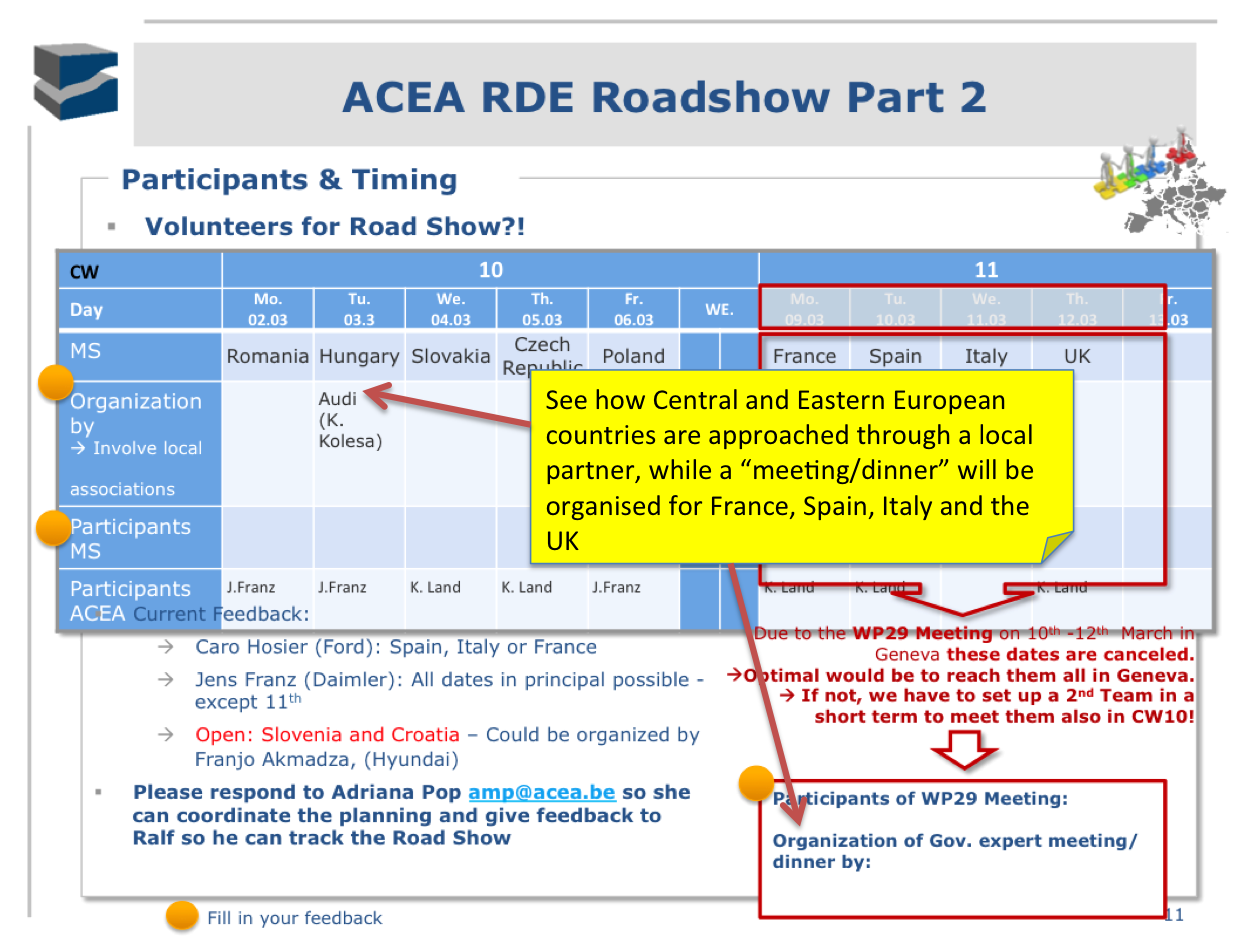
The two week Roadshow targeted Eastern and Central European countries in its first week,v while aiming at Western Europe (France, Spain, Italy, UK), in the second. However, as this clashed with the World Forum for Harmonization of Vehicle Regulation (WP.29) in Geneva – a UN body dealing with car regulations in Europe – the presentation states that the “optimal would be to reach them all in Geneva”. The plan: bring government experts together over dinner. Yet again, privileged access for industry lobbyists reaches far further than Commission or government offices.
Wooing member states via the Roadshow appears to have paid off. According to friendly sources within the Commission's Comitology group in charge of deciding what form the RDE tests would take (formally called the Technical Committee on Motor Vehicles, or TCMV, and made up of stakeholders, the Commission and national governments), Central and Eastern European countries argued in favour of the car manufacturers' positions, as did Spain, Italy, and Sweden, introducing the ACEA positions mapped out in the leaked strategy.vi Member states were essential in getting ACEA what it wanted, but the key was having a well planned and executed strategy that linked the national to the European level.
Never just 'expertise'
The Commission has consistently defended the inclusion of car manufacturers in policy making due to a lack of internal expertise which industry can make up for. However, this document further underlines the political nature of the expertise provided, and how information that might seem technical eg what 'normal' driving conditions might be, is actually used as a bargaining chip by industry to secure further weakening of regulation, ie industry can redefine 'normal' if the tests are delayed or exemptions are increased. Information from the car industry is not linked to what is and is not technically feasible for manufacturers, but instead a calculation on how much profit doing so would cost them.
The involvement of ACEA in the regulatory process is clearly as a stakeholder, not an expert. The presentation outlines a multi-tiered negotiating strategy, with three compromises between their walk-in and walk-out positions – and the fact they have a walk-out position shows they see themselves as a partner without whom regulations could not be made. The presentation even asks the question (twice) “Is this a realistic compromise which can be accepted by DG Grow [sic] and MS [member states]?” when proposing different demands and concessions ACEA could make during the negotiations. Of note, DG GROWTH – for whom Nikolaus Steininger works – is presented in another slide as a key ACEA ally, unlike DG Environment, which the leaked document singled out as a “hardliner” and one of the threats to diesel cars.
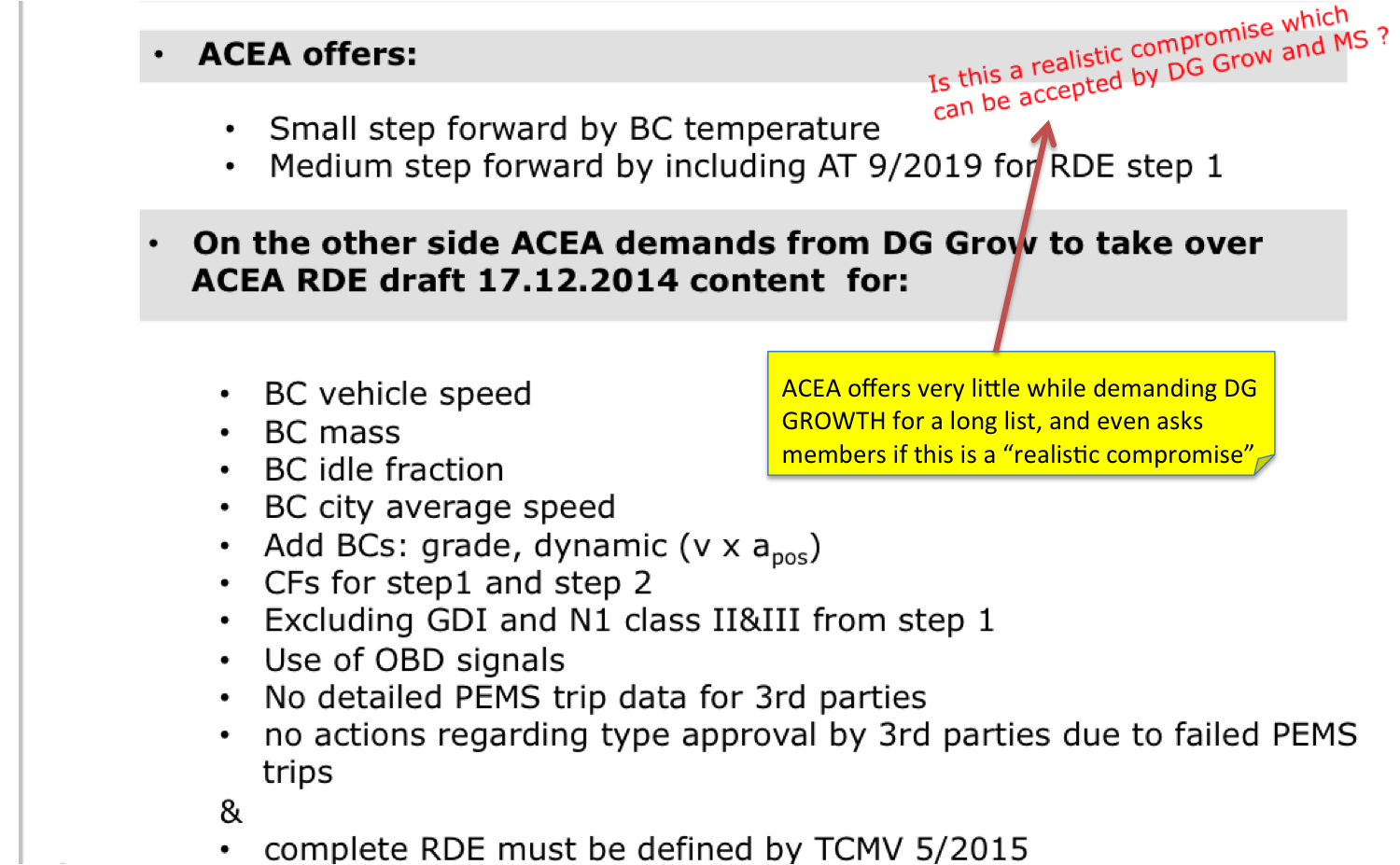
Moreover, the 'expertise' coming from ACEA is not even representative of all of its members, and is instead the lowest common denominator. One revealing table within the presentation (see picture) plots feedback from ten different manufacturers on the RDE test elements, rating them as to whether they are “must have”, “give up if absolutely necessary”, or “negotiable”. There was huge diversity in the responses, meaning the eventual position was always going to be the lowest compromise rather than championing best practice. However, the lack of internal expertise at the Commission, its inability to find experts independent from industry and an effective but limited civil society presence means there are few counter-weights to car manufacturers demands.
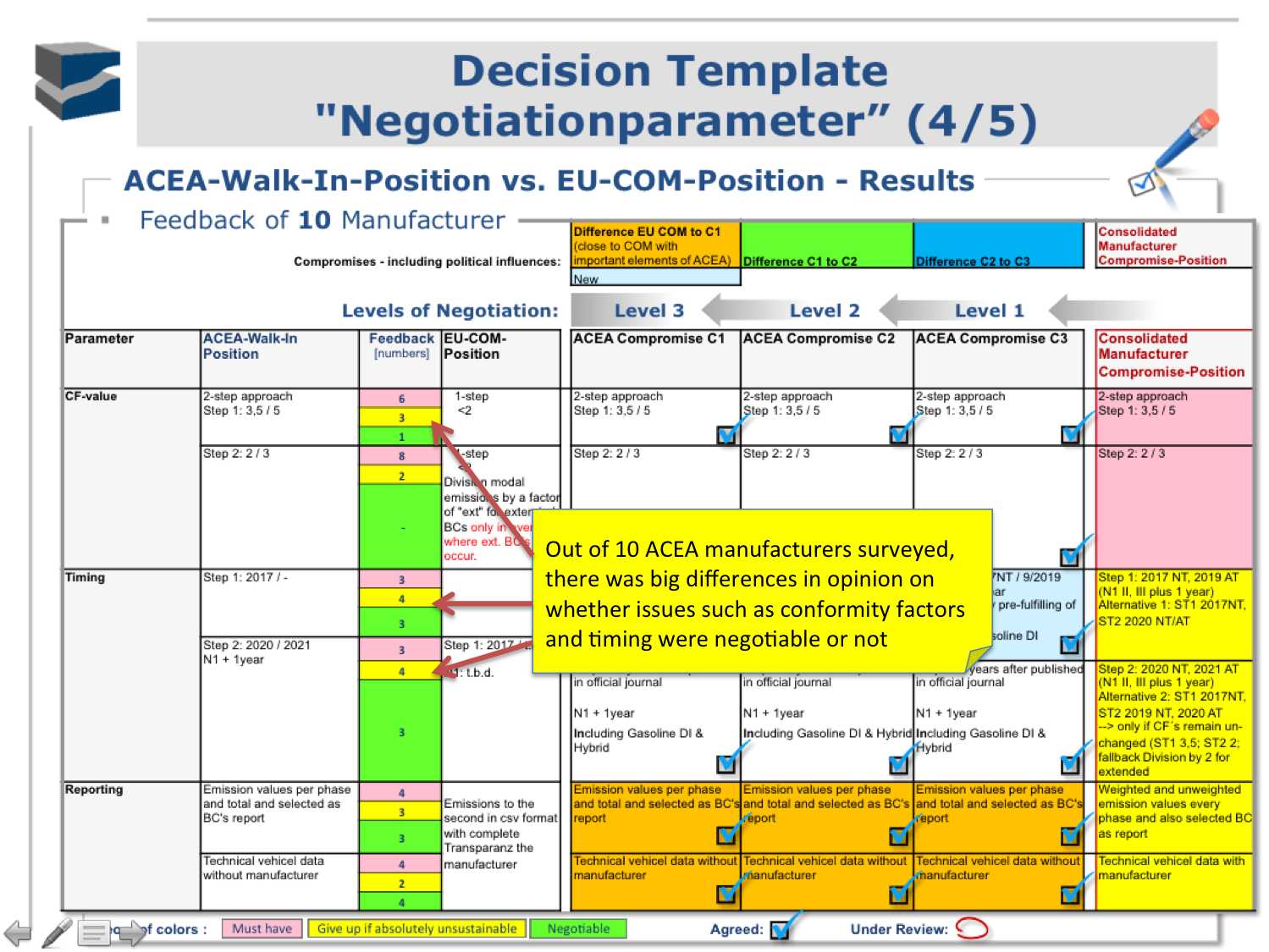
The inclusion of the car industry throughout the regulatory process is less to do with expertise and more to do with how the Commission traditionally regulates industry with and in the interest of industry itself. The recent Better Regulation agenda, President Juncker's flagship initiative aimed at reducing regulations that get in the way of industry, goes even further, enshrining the interests of industry above those of workers or the environment in policy making. In the hands of Vice-President Frans Timmermans, the euphemistically-titled Better Regulation agenda is in fact putting yet more power in to the hands of industries the Commission is supposed to be regulating. It is an agenda that has unsurprisingly been embraced by ACEA and its members, but unfortunately for Europe's 500 million citizens it narrowly defines 'costs' as loss of industry profits rather than impacts on air quality, CO2 emissions, public health, or the environment.
The conflict of interest and lack of impartiality on behalf of car manufacturers is glaring to see. Indeed, the Commission itself is more than aware: during DG Climate Action's stakeholder meeting to present studies on CO2 emissions from light vehicles, a presentation from consultants Ricardo-AEA Ltd showed the car industry consistently over-estimated the costs of new emissions regulations before they were introduced. Yet they are still being considered credible sources and the weight of their words is set to increase with the cost-obsessed Better Regulation agenda. However, this is a problem that goes far wider than the car industry and is deep-rooted across the entire Commission.
Car industry should be kept at arms length from writing regulations
The Parliamentary Committee of Inquiry that has now started its work will have a tough task ahead of it sifting through the reams of documents created during the legislative process. But what has been clear from the beginning of the dieselgate scandal is that the way law-making is done in Brussels poses a serious problem to the public interest, in this case public health and environment. Previous correspondence between the Commission and the car industry shows how pro-actively the Commission has been in involving manufacturers, while other exchanges CEO has obtained revealed the delaying and blocking of ACEA and its members. But the leaked lobbying strategy described in this article shows both sides – the Commission's proactive pursuit of the car industry, as well as the sophistication of tactics used by industry in pushing its own interests, regardless of at the cost of air pollution or premature deaths.
If the Commission is serious about tackling privileged access and protecting the public interest, it should seriously question the impact of the car industry's involvement in the regulatory process. The World Health Organisation answered the question definitively when it decided to restrict contact wherever possible between public health officials and the tobacco lobby in order to protect public interest policy making. In light of the dieselgate scandal, similar measures should be taken against ACEA and other car manufacturers, and if the Commission still needs technical information from industry, hearings and other transparent formats can serve both their own needs and the public interest.
ACEA presentation available here in pdf format.
Original PowerPoint: ![]() 150213_praesentation_acea_compromise_status-1-1.pptx
150213_praesentation_acea_compromise_status-1-1.pptx
i Volkswagen admitted having installed a 'defeat device' on its diesel cars to reduce NOx emissions under laboratory test conditions but not in the real world. Tests show that almost all cars legally complying with the Commission's emissions limits (called 'Euro 6') in fact emitted on average seven times as much in the real world as in the laboratory. For an overview of the current situation among manufacturers, see http://www.transportenvironment.org/newsroom/blog/it-time-carmakers-clean-their-act
ii At the time of writing, the Commission had not denied or confirmed the meeting took place to CEO, while a search for public events involving Steininger and Greening and/or ACEA and the Commission on that date, eg a debate, did not produce anything.
iii Comitology groups are set-up by the European Commission to work out the technical details of how Directives and regulations are implemented. In the case of the Real Driving Emissions tests, the relevant Comitology group is the Technical Committee on Motor Vehicles, with all national governments, the Commission and stakeholders (ACEA; NGO Transport and Environment). See for example the meeting on October 28th 2015, http://ec.europa.eu/transparency/regcomitology/index.cfm?do=search.dossierdetail&hdi47H/nymYsbNlXdPttFYryIrLuSpzaqj27FLvPJFOyG5rQQgbwbZtV5hugZF/x
iv This was threatened in a letter from ACEA to the European Commission related to meeting the RDE tests, see http://corporateeurope.org/sites/default/files/attachments/2015-07-31-from_acea_to_ec_redacted.pdf
v Romania, Hungary, Slovakia, Czech Republic, and Poland.
vi Within the presentation is an 'ACEA Action Plan' with a timeline in which identifying member states to introduce ACEA positions was a key task to come out of the Roadshow, earmarked for the “first week of March”.

Comments
Paul Greening was previously in the emissions unit at DG Environment. Revolving doors spinning rather fast....
Thank you. A heavy read, but concise and fully referenced. It should be compulsory reading for members of the Green Remain groups. I cannot understand their heads in the sand attitude to the vast amount of evidence accruing which shows how the armies of corporate lobbyists work hand in hand with the Commission against the interests of EU "citizens" in every aspect of their lives.
In 1995 I was all for a Union. Then, year by year, that feeling has gradually worn down. Still pro EU, though, due to the fact that the European Union law is giving our national legislation a good thrashing. The dieselgate scandal just goes to show that not only money and power have a corrupting effect, but also relations. The ACEA affair makes me wonder how clever it’s to promote the fox to guard the hen. The people involved in this kind of activities no doubt represent a real menace to us all by undermining the very basis of our survival… in exchange for money! Indeed!
One thing is really puzzling me; with at pollution rate seven times larger than calculated we’re moving fast towards a not that entire friendly world. Even these mercenary souls can figure the result out of their actions. Do they seriously believe that they and their families won´t be influenced by a collapsing environment? Geeeessss! I will restrain myself from giving my opinion on people of that type. But apparently their elevator never ever reaches the top floor.
Instead of all the mumbo jumbo stuff they perform they should see to make the overrated and worthless (for ordinary people, that is) Market fulfill its promises of general prosperity and healthy planet. So far all I’ve seen is the perfect opposite. Horsemeat, eh? A bunch of insiders that by enriching themselves risked the European economy and created an atmosphere of distrust in the financial market that ten years later still hamper any real growth. VW, eh? Etc, etc.
No, no, Commission it’s time to put the action where the mouth is if you don’t want to also experience a Spexit, Swexit, Gexit and so on.